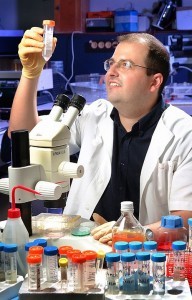Prof. Lior Gepstein of the Technion – Winner of the European Society of Cardiology Award
 The prestigious prize is awarded each year to two young researchers for “exceptional achievements in the first stages of their scientific careers”
The prestigious prize is awarded each year to two young researchers for “exceptional achievements in the first stages of their scientific careers”
Prof. Gepstein studies stem cells and recently succeeded in creating in his lab, using stem cells, a unique model for research and treatment of heart disease leading to fatal heart beat disruption. Together with researchers Ilanit Yitzhaki, Leonid Meisals, Irit Huber and additional colleagues, he successfully transformed skin cells, taken from a patient suffering from genetic life-threatening heart arrhythmia, into unique stem cells (induced pluripotent stem cells – iPS), and thereafter in his lab, turned these cells into heart cells. In the paper published in the respected journal Nature, the researchers showed that the heart cells that were created in their lab expressed the electrical disruption characteristic of the genetic heartbeat disruption syndrome from which their patient suffered (elongated QT interval syndrome). Following this, the group of researchers using an electrical recording technique examined what was being received from the mechanisms at the root of the patient’s disrupted heartbeat and the effect of medications that may worsen or treat the disease.
The results of the work emphasize the latent potential in the possibility of re-programming adult cells in order to create “induced pluripotent stem cells” specific to the individual patient. These cells, similar to fetal stem cells, have the ability to differentiate into any type of cell in the body (e.g., heart cell, nerve cell, liver cell, etc.). Given that the cells are genetically identical to the patient from whom they are taken, they can be used as a unique model to study different genetic diseases, to develop medications, and for use in the emerging field of personalized medicine. Furthermore, the fact that different types of cells (such as heart cells) that are unique to each patient can be created may pave the way for future use of these cells in the developing field of tissue engineering and cell transplant for the treatment of a range of diseases (e.g., congestive heart failure).
Above: Prof. Lior Gepstein. Photo by: Technion Spokesman


